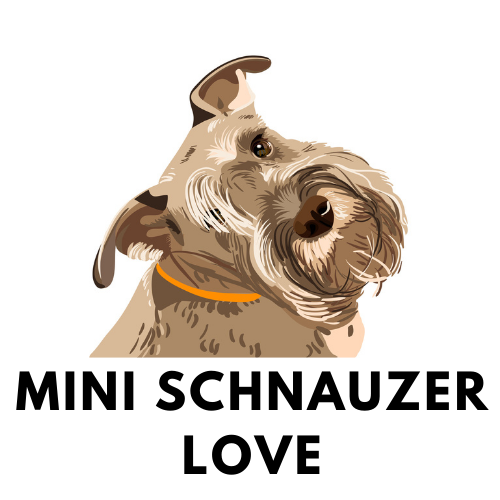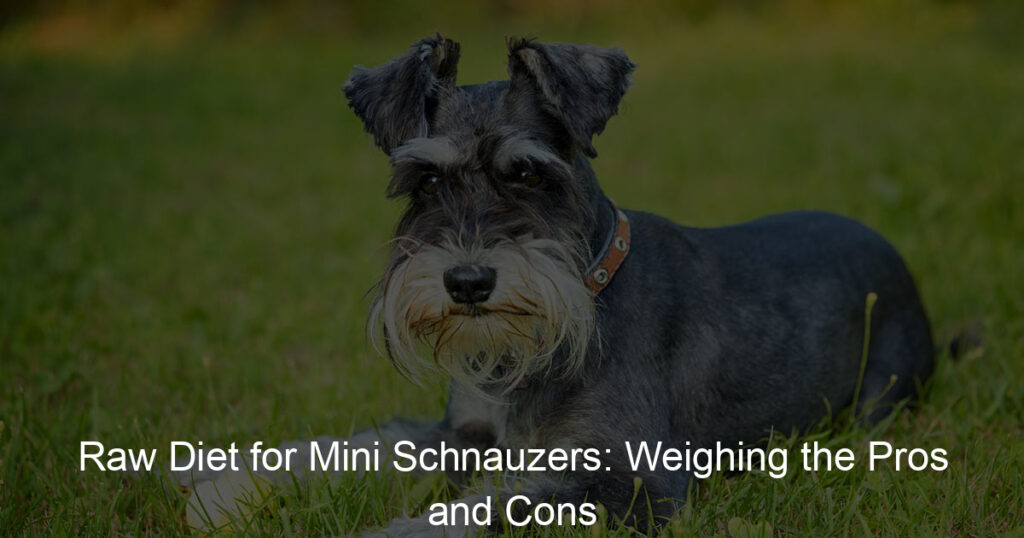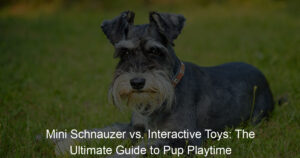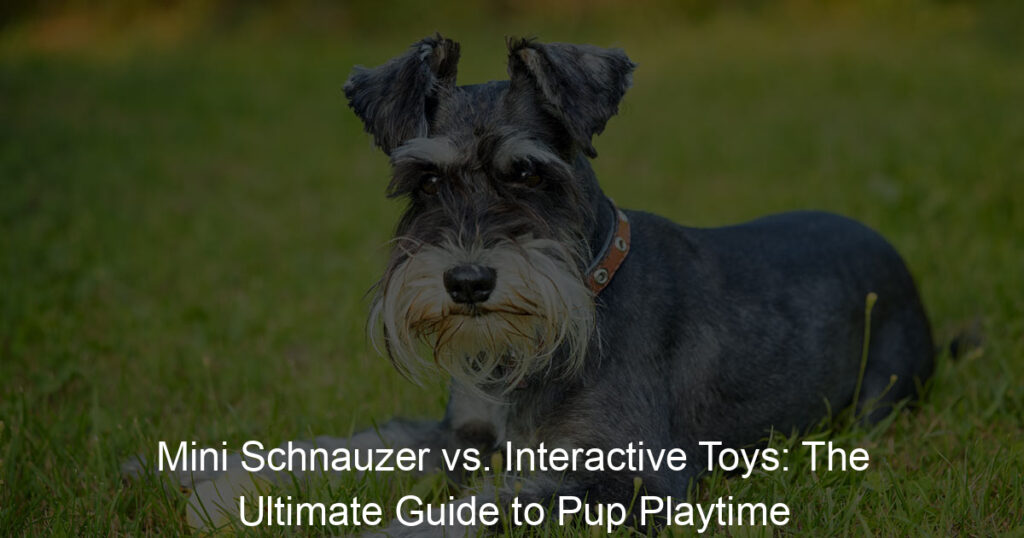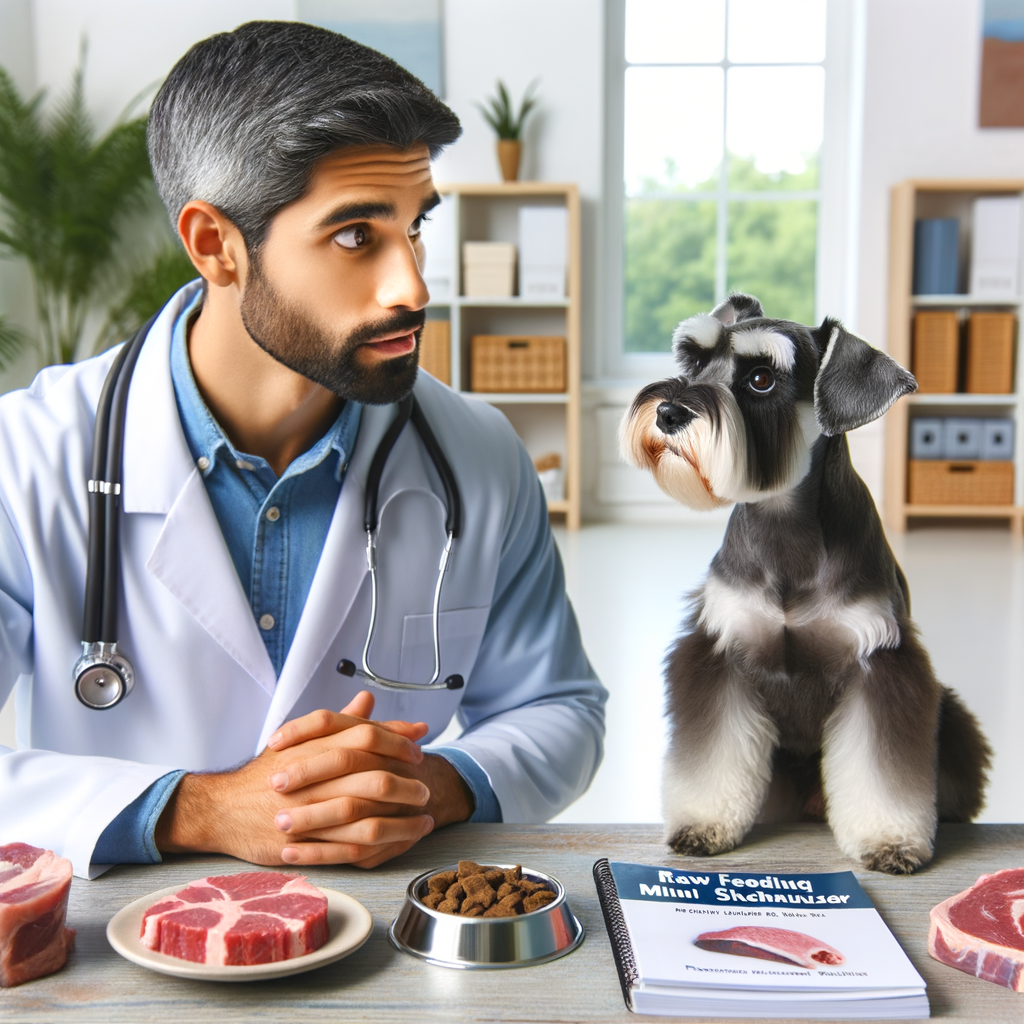
Introduction to Raw Feeding for Mini Schnauzers
Feeding your Mini Schnauzer can be a challenging task, especially when you’re trying to provide the best nutrition possible. One diet that has been gaining popularity among dog owners is the raw food diet. But what exactly is raw feeding, and why is it considered for Mini Schnauzers? Let’s delve into these questions.
- Understanding the concept of raw feeding
- Why raw feeding is considered for Mini Schnauzers
Raw feeding, also known as the Biologically Appropriate Raw Food (BARF) diet, is a type of diet for dogs that involves feeding them raw meat and other uncooked ingredients. The idea behind this diet is to mimic the natural, wild diet of wolves, which are the ancestors of domestic dogs. This diet includes components like muscle meat, bone, fat, organ meat, and even fruits and vegetables.
Mini Schnauzers, like all dogs, can benefit from a diet that is rich in nutrients and close to what their ancestors would have eaten in the wild. Raw feeding is considered for Mini Schnauzers because it can provide a range of health benefits. These include improved digestion, healthier skin and coat, reduced allergy symptoms, and better weight management. It’s important to note that while raw feeding can have its benefits, it’s not suitable for every dog. Always consult with your vet before making significant changes to your dog’s diet.
As we move forward, we will delve deeper into the pros and cons of raw feeding, take a closer look at the raw diet, and provide a comprehensive guide on raw feeding for Mini Schnauzers. Stay tuned to learn more about this intriguing approach to canine nutrition.
Pros and Cons of Raw Feeding
When it comes to feeding your Mini Schnauzer, it’s crucial to consider all options. One of these is raw feeding, a diet that consists mainly of raw meat, bones, fruits, and vegetables. Like any diet, raw feeding has its pros and cons. Let’s take a closer look at the benefits and drawbacks of this feeding method.
Benefits of Raw Feeding
Many pet owners have reported significant improvements in their pets’ health and vitality after switching to a raw diet. Here are some of the key benefits:
- Improved coat condition: A raw diet can lead to a shinier and healthier coat. This is because raw foods are rich in natural oils and high-quality proteins that are essential for coat health.
- Healthier teeth and gums: Chewing on raw bones can help clean your Mini Schnauzer’s teeth and promote gum health. This can reduce the risk of dental diseases, which are common in many dog breeds.
- Increased energy levels: Raw foods are generally easier for dogs to digest and absorb. This can lead to increased energy levels and overall vitality. Your Mini Schnauzer might become more active and playful, which is a clear sign of good health.
While these benefits are impressive, it’s important to remember that every dog is unique. What works for one might not work for another. Therefore, it’s crucial to monitor your Mini Schnauzer’s health and behavior closely after making any changes to their diet.
Drawbacks of Raw Feeding
While raw feeding can offer several benefits, it’s essential to be aware of the potential drawbacks. These can include the risk of bacterial contamination, difficulty in maintaining a balanced diet, and an increased risk of choking on bones. Let’s take a closer look at each of these concerns.
- Potential for Bacterial Contamination
- Difficulty in Maintaining a Balanced Diet
- Increased Risk of Choking on Bones
Raw food, especially meat, can be a breeding ground for harmful bacteria like Salmonella and E. coli. These bacteria can not only make your Mini Schnauzer sick but can also pose a risk to human members of the household. It’s crucial to handle and store raw food properly to minimize this risk.
Providing a balanced diet is one of the biggest challenges of raw feeding. Dogs need a specific ratio of protein, carbohydrates, and fats, along with a variety of vitamins and minerals. Achieving this balance with raw food can be difficult and requires careful planning and knowledge of canine nutrition.
Raw bones can be a choking hazard for dogs, especially smaller breeds like the Mini Schnauzer. Bones can also splinter and cause damage to the dog’s mouth, throat, or digestive system. It’s essential to supervise your dog while they’re eating bones and to choose bones that are appropriate for their size and chewing style.
In conclusion, while raw feeding can have benefits, it also comes with its own set of challenges. It’s important to thoroughly research and consider these potential drawbacks before deciding to switch your Mini Schnauzer to a raw diet.
Raw Diet for Dogs: A Closer Look
Feeding your Mini Schnauzer a raw diet can be a rewarding experience. It allows you to have full control over what your pet is consuming, ensuring they get the best possible nutrition. Let’s take a closer look at the components of a raw diet for Mini Schnauzers.
Components of a Raw Diet for Mini Schnauzers
A balanced raw diet for Mini Schnauzers typically consists of three main components: protein sources, fruits and vegetables, and supplements. Let’s delve into each of these components.
- Protein sources
- Fruits and vegetables
- Supplements
Protein is a vital part of a Mini Schnauzer’s diet. It helps to build and repair body tissues and is essential for growth and development. Common protein sources in a raw diet include lean meats like chicken, beef, and fish. Remember, variety is key to a balanced diet, so try to rotate between different protein sources.
Fruits and vegetables provide essential vitamins, minerals, and fiber. They help to support a healthy immune system and promote good digestive health. Some suitable options for Mini Schnauzers include carrots, peas, apples, and blueberries. However, not all fruits and vegetables are safe for dogs, so always do your research before introducing a new food.
Even with a varied diet, your Mini Schnauzer may still need some supplements to ensure they’re getting all the nutrients they need. Common supplements include omega-3 fatty acids for healthy skin and coat, probiotics for gut health, and joint supplements for older dogs. Always consult with your vet before starting any new supplement regimen.
In conclusion, a raw diet for Mini Schnauzers consists of a variety of protein sources, fruits and vegetables, and necessary supplements. Always consult with a vet or a pet nutrition expert to ensure your dog’s diet is balanced and meets all their nutritional needs.
Preparing a Raw Meal for Your Mini Schnauzer
Feeding your Mini Schnauzer a raw meal can be a rewarding experience, but it requires careful preparation. Here are some key steps to follow:
- Choosing the right ingredients
- Proper handling and storage
- Feeding guidelines
When preparing a raw meal for your Mini Schnauzer, it’s crucial to choose the right ingredients. A balanced raw diet should include a mix of lean meats, fruits, vegetables, and supplements. Lean meats like chicken, turkey, or beef are excellent sources of protein. Fruits and vegetables, such as apples, carrots, and spinach, provide essential vitamins and minerals. Finally, supplements like fish oil can help ensure your Mini Schnauzer gets the necessary fatty acids.
Proper handling and storage of raw food are vital to prevent bacterial contamination. Always wash your hands before and after handling raw meat. Store raw food in airtight containers in the refrigerator to keep it fresh. If you’re preparing meals in advance, you can freeze them for up to three months.
Feeding guidelines can vary based on your Mini Schnauzer’s age, weight, and activity level. As a general rule, an adult Mini Schnauzer should eat about 2-3% of its body weight per day. Puppies may require more food due to their rapid growth. Always monitor your dog’s weight and adjust the portions as needed.
Remember, transitioning to a raw diet should be done gradually to avoid digestive upset. Start by introducing small amounts of raw food into your Mini Schnauzer’s regular diet and gradually increase the portion over several weeks.
Feeding your Mini Schnauzer a raw diet can be a great way to ensure they’re getting all the nutrients they need for a healthy life. However, it’s essential to do your research and consult with a vet to ensure you’re providing a balanced diet.
Mini Schnauzer Nutrition: What You Need to Know
Understanding the nutritional needs of your Mini Schnauzer is the first step to ensuring their health and longevity. In this section, we’ll delve into the specifics of what these adorable little dogs need to thrive, how a raw diet can meet these needs, and when it might be necessary to consider a different diet.
- Nutritional requirements of Mini Schnauzers
- How a raw diet meets these requirements
- When to consider a different diet
Mini Schnauzers, like all dogs, require a balanced diet to stay healthy. This includes proteins, carbohydrates, fats, vitamins, and minerals. However, due to their small size and high energy levels, they require a diet that is high in protein and low in fat. They also need a good amount of fiber to help with digestion. It’s important to note that Mini Schnauzers are prone to certain health issues like pancreatitis and bladder stones, so their diet should be tailored to prevent these conditions.
A raw diet, often referred to as Biologically Appropriate Raw Food (BARF), can meet the nutritional needs of a Mini Schnauzer. Raw diets typically consist of raw meat, bones, fruits, and vegetables, providing a rich source of protein, essential fats, and fiber. The raw bones also contribute to dental health by naturally cleaning your dog’s teeth as they chew. However, it’s crucial to ensure the diet is balanced and varied to provide all necessary nutrients.
While a raw diet can be beneficial for many Mini Schnauzers, it’s not suitable for all. If your dog has a compromised immune system, is a puppy, or has certain health conditions, a raw diet may not be the best choice. Additionally, if your Mini Schnauzer is not thriving on a raw diet – signs may include weight loss, dull coat, or lethargy – it might be time to consider a different diet. Always consult with your vet before making significant changes to your dog’s diet.
In conclusion, a raw diet can be a good option for many Mini Schnauzers, but it’s essential to monitor your dog’s health closely and consult with a vet regularly. Remember, every dog is unique, and what works for one might not work for another.
Is Raw Feeding Healthy for Mini Schnauzers?
As a Mini Schnauzer owner, you might be wondering if a raw diet is a healthy option for your furry friend. Let’s explore what scientific studies, veterinarians, and case studies of Mini Schnauzers on a raw diet have to say.
- Scientific Studies on Raw Feeding
- Veterinarian Opinions on Raw Feeding
- Case Studies of Mini Schnauzers on a Raw Diet
Scientific studies on raw feeding for dogs have yielded mixed results. Some studies suggest that raw diets can provide a range of health benefits, such as improved coat condition, healthier skin, and increased energy levels. However, other studies warn about potential risks, including nutritional imbalances and the possibility of bacterial contamination. It’s important to note that these studies are not specific to Mini Schnauzers, and individual dogs may respond differently to a raw diet.
Veterinarian opinions on raw feeding also vary. Some vets advocate for raw diets, arguing that they more closely mimic a dog’s natural diet in the wild. Others caution against raw feeding due to the aforementioned risks. It’s always a good idea to consult with your vet before making any significant changes to your Mini Schnauzer’s diet.
There are numerous case studies of Mini Schnauzers thriving on a raw diet. Many owners report improvements in their dogs’ overall health and vitality. However, there are also cases where Mini Schnauzers have experienced health issues as a result of a raw diet, such as digestive problems and nutrient deficiencies. These cases underscore the importance of carefully planning and monitoring a raw diet to ensure it meets all of your Mini Schnauzer’s nutritional needs.
In conclusion, whether raw feeding is healthy for Mini Schnauzers depends on a variety of factors, including the specific composition of the diet and the individual dog’s health status and nutritional needs. It’s essential to do your research and consult with a vet before deciding to switch your Mini Schnauzer to a raw diet.
Raw Feeding Guide for Mini Schnauzers
Switching your Mini Schnauzer to a raw diet can be a significant change for both you and your furry friend. It’s essential to approach this transition with care, understanding, and patience. Let’s dive into how to make this change as smooth as possible.
Transitioning Your Mini Schnauzer to a Raw Diet
Transitioning your Mini Schnauzer to a raw diet involves three main steps: deciding between a gradual transition or an immediate switch, monitoring your pet’s reaction, and adjusting the diet as needed. Let’s explore each of these steps in detail.
- Gradual transition vs. immediate switch
- Monitoring your Mini Schnauzer’s reaction
- Adjusting the diet as needed
Some pet owners prefer to switch their Mini Schnauzer’s diet immediately, while others opt for a more gradual transition. An immediate switch can be a shock to your pet’s system, but a gradual transition can help ease them into their new diet. It’s important to observe your pet during this time and adjust the pace of the transition as needed.
As you transition your Mini Schnauzer to a raw diet, it’s crucial to monitor their reaction closely. Look for changes in their energy levels, coat condition, and stool consistency. These can be indicators of how well they’re adapting to the new diet. If you notice any adverse reactions, it may be necessary to slow down the transition or consult with a veterinarian.
Every Mini Schnauzer is unique, and their dietary needs can vary. As such, it’s important to adjust their diet as needed. This might mean adding more or less of certain food types, or introducing new foods slowly to gauge their reaction. Remember, the goal is to provide a balanced, nutritious diet that supports your Mini Schnauzer’s health and wellbeing.
In conclusion, transitioning your Mini Schnauzer to a raw diet is a process that requires careful planning and monitoring. But with patience and dedication, you can help your pet thrive on their new diet.
Maintaining a Raw Diet for Your Mini Schnauzer
Keeping your Mini Schnauzer on a raw diet requires careful attention and a few key steps. Let’s explore these in detail.
- Regular vet check-ups
- Adjusting the diet as your Mini Schnauzer ages
- Addressing potential health issues
Regular visits to the vet are crucial when your Mini Schnauzer is on a raw diet. These check-ups allow the vet to monitor your dog’s health and ensure the diet is providing the necessary nutrients. Vets can detect any deficiencies or excesses in nutrients early and make necessary adjustments to the diet. Remember, prevention is better than cure!
As your Mini Schnauzer grows older, their nutritional needs change. Puppies require more protein for growth, while older dogs may need fewer calories to prevent weight gain. Regular vet visits will help you adjust your dog’s diet as they age, ensuring they get the right nutrients at every stage of life.
Some health issues may arise when your Mini Schnauzer is on a raw diet. These could include digestive problems, nutrient deficiencies, or even bacterial infections from raw meat. Regular vet check-ups will help catch these issues early, but it’s also important to know the signs yourself. If your dog seems lethargic, loses weight, or has digestive issues, it may be time to revisit their diet and consult with your vet.
In conclusion, maintaining a raw diet for your Mini Schnauzer involves regular vet check-ups, adjusting the diet as your dog ages, and being vigilant about potential health issues. With careful attention and the right guidance, your Mini Schnauzer can thrive on a raw diet.
Conclusion: Weighing the Pros and Cons of a Raw Diet for Mini Schnauzers
After a thorough exploration of the raw diet for Mini Schnauzers, it’s time to weigh the benefits against the drawbacks. This will help you make an informed decision about what’s best for your furry friend.
- Recap of the benefits and drawbacks of raw feeding
- Final thoughts on raw feeding for Mini Schnauzers
- Encouragement for further research and consultation with a vet
Feeding your Mini Schnauzer a raw diet can have numerous benefits. It can lead to a shinier coat, healthier skin, cleaner teeth, and higher energy levels. It may also reduce the risk of certain health issues, such as obesity and allergies.
However, raw feeding also has its drawbacks. It can be time-consuming to prepare, and it’s crucial to ensure your dog is getting a balanced diet. There’s also a risk of bacterial contamination if the raw food isn’t handled or stored properly.
Raw feeding can be a great option for Mini Schnauzers, but it’s not for everyone. It requires a commitment to careful meal planning and preparation. If you’re willing to put in the effort, it can be a rewarding way to enhance your dog’s health and wellbeing.
Before making any major changes to your Mini Schnauzer’s diet, it’s important to do your own research and consult with a vet. They can provide personalized advice based on your dog’s specific needs and health status. Remember, every dog is unique, and what works for one might not work for another.
In conclusion, the decision to switch to a raw diet for your Mini Schnauzer should not be taken lightly. It’s a commitment that requires time, effort, and a deep understanding of your dog’s nutritional needs. But with the right approach, it can be a rewarding journey towards a healthier and happier life for your furry friend.
